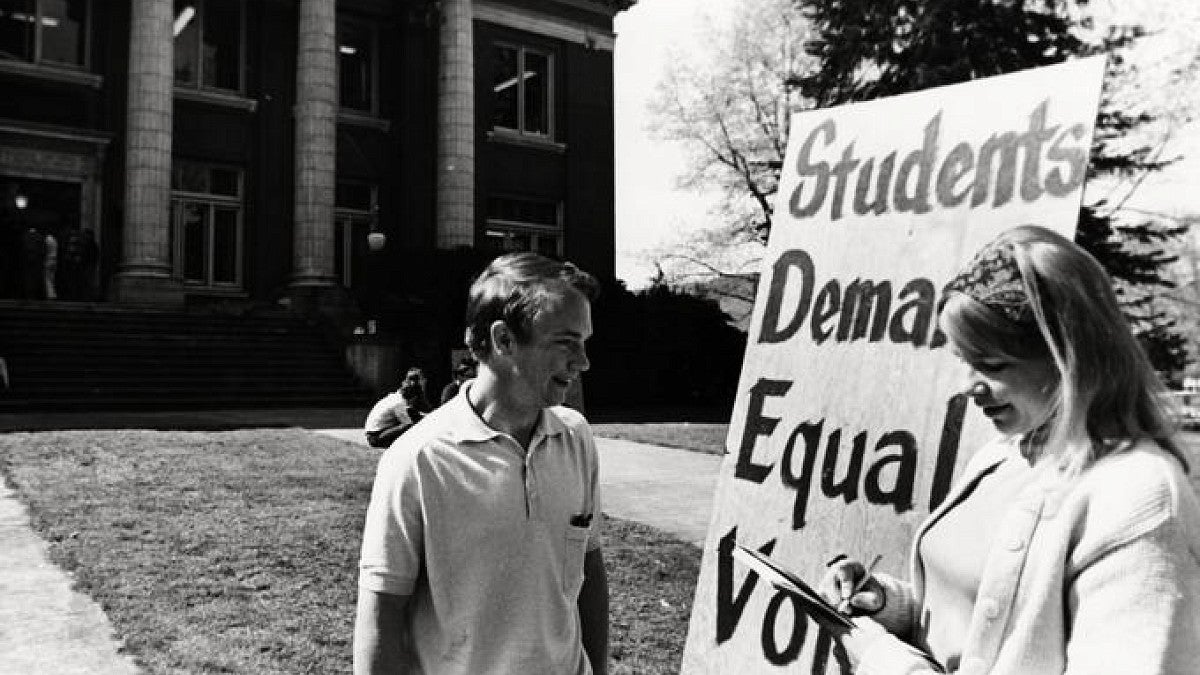Life for students can be complicated, and even more so when a legal issue arises. For fifty years, University of Oregon students have had a place to turn to help with almost anything from landlord and tenant issues to traffic infractions.
Students have a lot on their plates, said attorney Ilona Givens, director of Associated Students of the University of Oregon (ASUO) Student Legal Services. They may be away from home for the first time. Many are working jobs in addition to attending classes. Some of them have young children.
“We don’t want their legal problems to keep them from studying or passing their tests. We don’t want them to drop their classes,” Givens said.
“While each case requires participation from the student to help them through their problem, I can see the stress lifting off their shoulders when I tell them, ‘It’s going to be OK,’” Givens said. “This is why we are here.”
Celebrating its 50th anniversary, the student legal services program at the UO was one of the first of its kind in the nation and quickly became a model for universities across the country.
The program was established through the ASUO in September 1971.
“The concept was born out of increasing complications in the lives of students,” Givens said.
With the Vietnam War and student protests, there was a lot going on in the late 1960s on college campuses, Givens said. “Life was getting more serious.”
Robert Ackerman was the first attorney hired at the UO to provide one-on-one legal services to students. Graduating from the UO in 1958 and from the UO School of Law in 1963, Ackerman was tapped to do a study and make a proposal for a student legal services program.
Upon receiving funding through ASUO, the office was established and contracted with Ackerman part time. Givens said inquiries from universities around the country began to stream in, asking Ackerman how they could create similar programs on their own campuses.
As university enrollment grew, so did the demand for legal services for students. Givens was hired as the program’s first full-time director in 1987.
All students who pay the Incidental Fee are eligible to receive legal advice and consultation from Givens and two other staff attorneys—all three happen to be UO School of Law alumni. Each provides services that reflect their levels of experience and interests in different areas of law, Givens said, so they can provide capable, targeted legal assistance based on the topic.
While covering a wide range of legal issues, Givens said her team deals most often with landlord and tenant issues, family and domestic law cases, traffic infractions, property damage and personal injury. They will also represent students on misdemeanor criminal charges in Lane County Circuit Court and Eugene Municipal Court.
There is no charge to students for legal consultation and advice. Full in-court representation in misdemeanor criminal cases can also be provided. While there is no additional fee for attorney time that might be involved with a trial, students are responsible for the cost of any court fees, fines or penalties.
Givens recognizes that it takes a special kind of attorney to serve college students.
“You can talk to any of the lawyers at student legal services, and they will tell you that they really enjoy working with and for students. They feel like they are really making a difference.”
When a client drops by to thank them, or a card arrives in the mail, it reinforces the reason behind their work.
“It makes you realize that our overarching mission is student retention,” Givens said.
Givens credits the original ASUO student government that identified the need for the service and put the pieces into play to get it established, as well as all of those who have come after them who have continued to support the funding for the program.
“Their little idea way back in the late ‘60s that culminated in the opening operations of Student Legal Services in September of 1971 was really prescient, that this would be a thing that wasn’t going to be temporary. It was going to continue to serve students.”
“The student government gave this gift, way back when, to their students, and each student government has continued to do that. They recognize the value of this service to students.”
—By Colleen Schlonga, Student Services and Enrollment Management


